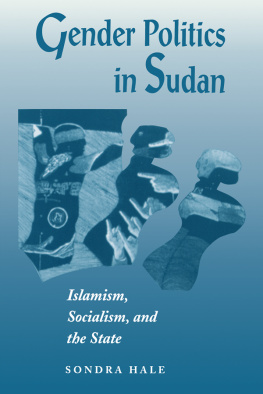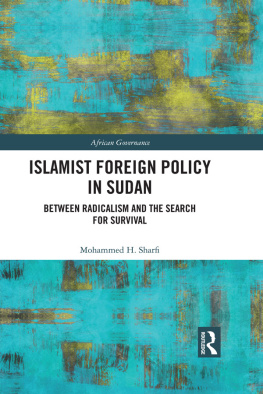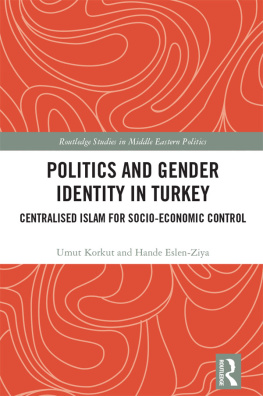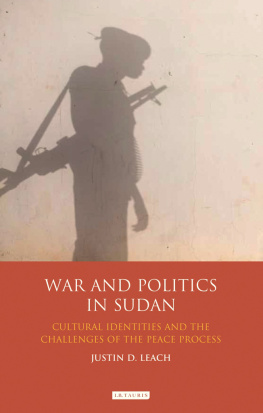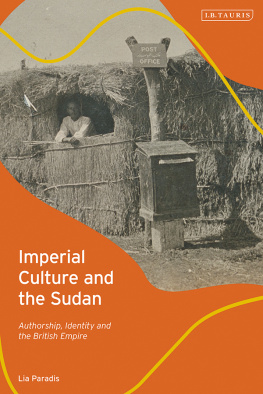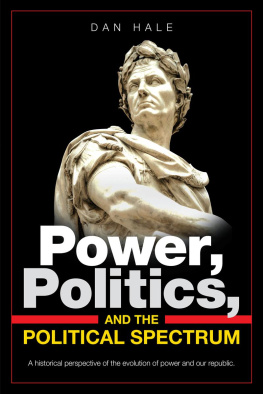First published 1997 by Westview Press
Published 2018 by Routledge
2 Park Square, Milton Park, Abingdon, Oxon OX14 4RN
711 Third Avenue, New York, NY 10017, USA
Routledge is an imprint of the Taylor & Francis Group, an informa business
Copyright 1997 Taylor & Francis
All rights reserved. No part of this book may be reprinted or reproduced or utilised in any form or by any electronic, mechanical, or other means, now known or hereafter invented, including photocopying and recording, or in any information storage or retrieval system, without permission in writing from the publishers.
Notice:
Product or corporate names may be trademarks or registered trademarks, and are used only for identification and explanation without intent to infringe.
Library of congress Cataloging-in-Publication Data
Hale, Sondra.
Gender politics in Sudan : Islamism, socialism, and the state /
Sondra Hale.
p. cm.
Includes bibliographical references and index.
ISBN 978-0-8133-3370-0 (pbk.)
1. Women in politicsSudan. 2. Women and socialismSudan.
3. Women in IslamSudan. 4. FeminismSudan. I. Title.
[HQ1236.5.S73H35 1997]
305.4209624dc21
97-9394
CIP
ISBN 13: 978-0-8133-3370-0(pbk)
Acknowledgments
This research is based on years of fieldwork in Sudan and short periods in Egypt and Eritrea. The Sudanese scholars, friends, and government officials to thank number in the hundreds; some I cannot name at this point in Sudans political history, as it would put them at risk.
There are specific people to be thanked here. I have concentrated my thanks on those who helped or influenced me during my 1988 field trip (from which most of the material on Islamism derives). However, since on the Sudanese Communist Party and Womens Union is based on my 1970s research, and some of the gendered labor and economics data on 1981 research, I want to thank my research assistants for all three periods: Omer Baba, Fatma Khalid, Sunita Pitamber, Amal Abdel Rahman, William Young, and Sherifa Zuhur.
Those who hosted me at the University of Khartoum were Fahima Zahir and Taj el-Anbia el-Dawi, who served as Heads of the Department of Anthropology, and many other colleagues associated with the department. I gained significant insights from conversations with Samia el-Nagar, Balghis Badri, Amal Hassan, and especially Zeinab el-Bakri and Idris Salem el-Hassan. Others at the university who guided me in my research were Fawzia Hammour, Abdallahi An-Naim, Abdallahi Ali Ibrahim, Gilal el-Din el-Tayib, and from Omdurman Ahlia University, Farouk Kadouda and the late Mohamed Omer Beshir (who inspired so much research on Sudan).
Outside of the university milieu many helped by setting up interview contacts or by being interviewed themselves: my longtime friend Judge Nagwa Kamal Farid, Suad Ibrahim Ahmed, whose work I have followed for decades, and Fatma Ahmed Ibrahim, Sudans best-known woman political leader. None I have named should be held responsible for my views.
Many of my ideas were developed in association with organizations and groups around the world: the now dormant Socialist-Feminist Network of Southern California, the various womens and African/Middle Eastern studies programs with which I have been associatedmost recently, UCLAsthe Association of Middle Eastern Womens Studies (especially Suad Joseph, Mervat Hatem, Judith Tucker, Julie Peteet, Mary Hegland, Erika Friedl, and Leila Ahmed), Feminist Focus on Middle East and Africa (among them Nancy Gallagher, Sherna Gluck, Sherifa Zuhur, Sherry Vatter, Nayereh Tohidi, Tsion Gad, Cheryl Dandridge-Perry, Amina Adan, Pat Kabra, Monhla Hlahla, and Soraya Altorki), UCLAs International Gender Study Group (among them Nikki Keddie, Ned Alpers, Jasamin Rostam, Lloys Frates, Christine Ahmed, and Sandy de Grijs), and the Center for the Pacific-Asian Family (especially Linda Ikeda-Vogel), to name only a few. Valentine Moghadam, whose work has been important to my own, invited me to Helsinki for a breakthrough workshop on identity politics and women that resulted in a provocative volume.
For support networks, in addition to the above I want to acknowledge Emily Abel, Sharon Bays, Carole Browner, Sandra Harding, Katherine King, Valerie Matsumoto, Karen Sacks, and Miriam Silverbergmy UCLA familywhich also includes a group of very smart and creative graduates and undergraduates in Middle Eastern/African and womens studies.
The recognition of my intellectual and political indebtedness to my two teachers, Hilda Kuper and Leo Kuper, now deceased, would fill a separate volume. I remember them often in my daily life and in my work, as I do my late close friend, Linda Hackel.
The manuscript itself benefited from very close readings by Sherna Gluck, Ellen Gruenbaum, and Victoria Bernal. Shernas feminist insights combined with her knowledge of womens resistance movements informed this book, as did Ellen and Victorias knowledge of Sudanese womens studies. My dear friend, Mary Beth Welch, read an early draft and made many useful suggestions, and Sandy de Grijs assembled the bibliography. Ed Corey was the final copy editor and helped beyond my expectations to raise the level of the work. I am deeply indebted to him and to Alison Hamilton, who worked with us. The very patient Westview Senior Editor Barbara Ellington took an early interest in the manuscript, and guided me through the publishing process. As usual I am indebted to Gerry Hale, this time for suggestions on and for helping me surmount a writers block, and to Mohamed Omer Bushara, one of my longtime collaborators, for the cover artwork.
Like all extensive research agendas, this one was funded by a number of different agencies and units, and I thank all of them for their support: Fulbright-Hays, American Research Center in Egypt, The American Association for University Women, the National Endowment for the Humanities, California State University, Northridge, UCLA Center for the Study of Women, the Gustave E. von Grunebaum Center for Near Eastern Studies, and the James S. Coleman African Studies Center.
My family provides me with an environment that nurtures my writing and creativity in that it is safe and loving. For that haven I thank Gerry, Alexa Almaz, and Adrienne Nabeela (Bulbul") Hale.
My extensive Sudanese family, some of whom I name in the dedication, includes two namesakes (the two Sondras), one in the northern Sudan, the other in the south. I hope I will see all of them again one day.
A Note on Arabic Transliteration: I have used a nonclassical, popular form of transliteration from the Arabic, hoping to make the book more accessible to a broader readership. Spelling inconsistencies have been unavoidable. One problem is that authors with Arabic names often vary the spelling of their own names, thwarting my attempt to accomplish two things at once: spell their names as they have chosen and be internally consistent.
Sondra Hale

